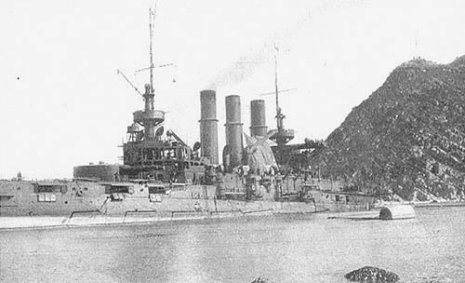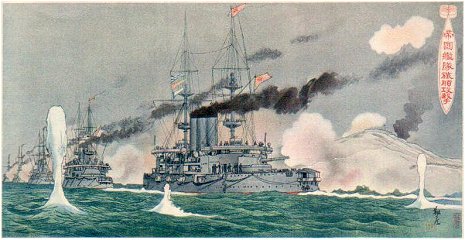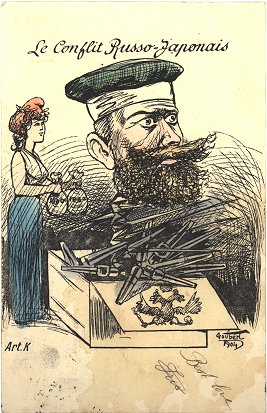Motivation - The Survival of The Imperial Russian GovernmentRussia's need for gold in 1909 can be traced to events that had occurred five years earlier. The 5% State Exchequer Bonds of 1904 (May 14, 1904) 
Russian battleship Retvizan on the rocks at Port Arthur Harbor entrance. On the morning of February 8, 1904, under the command of Vice-Admiral Togo Heihachiro, the main body of the Japanese Combined Squadrons appeared off Port Arthur (now Lushun, in North-East China), Russia's ice-free naval base in Manchuria, and home to its Pacific Fleet. Shortly after midnight the Japanese launched a surprise attack against Russia's Port Arthur naval base. At 0028 hours, February 9, 1904, the Japanese fired torpedoes at the moored and anchored Russian ships. Before the Russian gunners could open retaliatory fire, the best battleships of the Russian Pacific Fleet, Tsessarevitch and Retvizan, and also the first-rated cruiser Pallada, were hit.1 Thus began the Russo-Japanese War of 1904-05. 
1905 color print of the Japanese bombardment of Port Arthur in the Russo-Japanese War, with the Japanese chop, artist signature and caption inside bomb depiction (right). The conflict between Russia and Japan had its roots over the prior decade in the simultaneous ambitions of both Japan and Russia to develop 'spheres of influence' in Manchuria and Korea, mainly at the expense of China. After the surprise attack at Port Arthur, a series of quick Japanese victories, which astounded the world, soon followed. The Japanese were successful in their capture of Port Arthur (Jan., 1905), victorious under General Oyama at Shenyang (Feb.-Mar., 1905), and Admiral Togo's fleet defeated the Russian Baltic Fleet under Zinovi Rozhdestvenski, which had sailed a distance of over 18,000 miles to act as reinforcements, at Tsushima (May, 1905). The Russo-Japanese War ended, through the mediation of President Theodore Roosevelt, on September 5, 1905 with the signing of the Treaty of Portsmouth (New Hampshire). The Russo-Japanese War brought recognition to Japan as a major world power. Russia's defeat in the war increased the Russian public's dissatisfaction with the Tsarist government and precipitated substantial social upheavals in 1905 - and ultimately led, as a consequence of the massive costs of the war, to the collapse of the Tsarist regime in 1917.2  The early Japanese successes [in the Russo-Japanese War] made it easier for Japan, and harder for Russia, to obtain the foreign loans necessary for the continuation of hostilities - this was very much a "fight now, pay later" kind of war. The early Japanese successes [in the Russo-Japanese War] made it easier for Japan, and harder for Russia, to obtain the foreign loans necessary for the continuation of hostilities - this was very much a "fight now, pay later" kind of war.
J. N. Westwood, Witnesses of Tsushima
Sophia University, Tokyo, 1970, Page 38. The Russo-Japanese war was, to that time, the largest, most technologically advanced and complex war the world had ever witnessed. Such a war required significant finance, and, in 1904, the Imperial Russian Government turned primarily to its French bankers for funding, at first seeking support for a public bond offering.  RUSSIA NEGOTIATES RUSSIA NEGOTIATES
BIG LOAN IN FRANCE
------
Arrangements to Obtain $160,-
000,000 Practically Concluded.
------
PUBLIC SUBSCRIPTION LIKELY
------
Syndicate Guarantees Half of the Loan,
Which is to Bear Interest at
5 Per Cent.
------
London Times - New York Times
Special Cablegram.
Copyright, 1904. The New York Times.
 PARIS, April 25. - I hear that negotiations for a new loan between Russia and a Paris financial syndicate are as good as concluded. The amount of the loan is to be 800,000,00f., ($160,000,000.) PARIS, April 25. - I hear that negotiations for a new loan between Russia and a Paris financial syndicate are as good as concluded. The amount of the loan is to be 800,000,00f., ($160,000,000.)
 The syndicate, it is understood, includes the Russo-Chinese Bank and the Hottinger group. The loan is to be contracted in Treasury bonds at the rate of 98 per cent., and is to bear interest at 5 per cent. The syndicate, it is understood, includes the Russo-Chinese Bank and the Hottinger group. The loan is to be contracted in Treasury bonds at the rate of 98 per cent., and is to bear interest at 5 per cent.
 The syndicate guarantees 400,000,000f., and in all probability there will be a public subscription. The syndicate guarantees 400,000,000f., and in all probability there will be a public subscription.
 Without absolutely vouching for the accuracy of these particulars I may mention that the information reaches me from a good source. Without absolutely vouching for the accuracy of these particulars I may mention that the information reaches me from a good source.
New York Times, April 26, 1904, 2:2;
and The Times (London), April 26, 1904, 5:2. But, then: FRANCE BARS RUSSIAN LOAN.
------
Finance Minister Will Not Permit An-
Other Appeal to the Public
---
Special Cable to The New York Times.
Copyright, 1904, The New York Times.  PARIS, April 28. - I learn that negotiations have been in progress during the past few days for floating a new Russian loan on the French market, but they have in a measure failed owing to the absolute refusal of M. Rouvier, the Minister of Finance, to countenance another appeal being made to the French public. PARIS, April 28. - I learn that negotiations have been in progress during the past few days for floating a new Russian loan on the French market, but they have in a measure failed owing to the absolute refusal of M. Rouvier, the Minister of Finance, to countenance another appeal being made to the French public.
 As an alternative, M. Rouvier approves of an issue of Treasury bonds to the amount of between 300,000,00f. and 400,00,000f., redeemable in a short time and at a high rate of interest, not yet fixed. As an alternative, M. Rouvier approves of an issue of Treasury bonds to the amount of between 300,000,00f. and 400,00,000f., redeemable in a short time and at a high rate of interest, not yet fixed.
 It is understood that the Hottingers, at the head of the group of capitalists, are willing to take up the loan. It is understood that the Hottingers, at the head of the group of capitalists, are willing to take up the loan.
New York Times, April 29, 1904, 2:2. And the French banks and financiers do, indeed, take up the now non-public 1904 loan.  | RUSSIAN LOAN
------
Will Be Subscribed by Leading Financiers
------  Paris - The Éclair says that the Russian loan of 800,000,000 francs ($160,000,000) will not be a public loan, but will be subscribed by leading financiers, who will guarantee half and take the remainder in case foreign banks should refuse to co-operate. Paris - The Éclair says that the Russian loan of 800,000,000 francs ($160,000,000) will not be a public loan, but will be subscribed by leading financiers, who will guarantee half and take the remainder in case foreign banks should refuse to co-operate.
 Baron Ottinger left Tuesday for St. Petersburg. He goes thither with regard to the 250,000,000 francs that are to be raised between May and September. Four hundred millions are to be raised later, as may be needed. Baron Ottinger left Tuesday for St. Petersburg. He goes thither with regard to the 250,000,000 francs that are to be raised between May and September. Four hundred millions are to be raised later, as may be needed.
Wall Street Journal, April 28, 1904, 1:3. |
RUSSIAN LOAN SUBSCRIBED
------
French and Belgian Banks Take Entire
Issue of $200,000,000.  PARIS, May 5. - A representative of one of the banks forming the syndicate underwriting the Russian loan said: PARIS, May 5. - A representative of one of the banks forming the syndicate underwriting the Russian loan said:
 "We consider the loan closed in principle, but some details remain to be settled. The amount will be $200,000,000, and, as previously announced, at 5 per cent. for five years. The selling price is slightly above 98. The entire amount has already been taken by French and Belgian banks. The entire issue will be made at one time." "We consider the loan closed in principle, but some details remain to be settled. The amount will be $200,000,000, and, as previously announced, at 5 per cent. for five years. The selling price is slightly above 98. The entire amount has already been taken by French and Belgian banks. The entire issue will be made at one time."
New York Times, May 6, 1904, 2:7.  [In 1904] I began with a foreign loan. Paris had faith in our victory over Japan, and my approach to the French market was met very sympathetically. In some two weeks, without any special effort on my part, I had succeeded in effecting a 5 per cent short-term loan of 300,000,000 rubles, or 800,000,000 francs, to be redeemed in five years, that is, in 1909. The group of banks with which the loan was negotiated gave semi-official assurance that when the redemption of the loan was due another loan would be granted to consolidate this loan. [Emphasis supplied.] The success of the negotiation surpassed all of our expectations, and I was congratulated for my accomplishment. I must admit, however, that my part was the least deserving, for my success was due to the general belief of the French in our speedy victory over our enemy. This made subsequent disillusionment more painful and the part I later had to play more difficult. [In 1904] I began with a foreign loan. Paris had faith in our victory over Japan, and my approach to the French market was met very sympathetically. In some two weeks, without any special effort on my part, I had succeeded in effecting a 5 per cent short-term loan of 300,000,000 rubles, or 800,000,000 francs, to be redeemed in five years, that is, in 1909. The group of banks with which the loan was negotiated gave semi-official assurance that when the redemption of the loan was due another loan would be granted to consolidate this loan. [Emphasis supplied.] The success of the negotiation surpassed all of our expectations, and I was congratulated for my accomplishment. I must admit, however, that my part was the least deserving, for my success was due to the general belief of the French in our speedy victory over our enemy. This made subsequent disillusionment more painful and the part I later had to play more difficult.
Out of My Past; The Memoirs of Count Kokovtsov, Russian Minister of Finance, 1904-1914,
Chairman of the Council of Ministers, 1911-1914;
Edited by H.H. Fisher; Translated by Laura Matveev.
Stanford University, Calif., Stanford University Press, 1935, p 117. And, finally, the terms of the 1904 loan:  PARIS, May 11. - Following the return of M. Hoettinger from St. Petersburg a semi-official statement was made to-day of the final conditions of the Russian loan. The total issue will be $160,000,000 in 5 per cent Treasury bonds of $100 each, redeemable May, 1909, with interest payable in May and November annually, and the first interest to be paid next November. The bonds have the exceptional advantage of being exempt from present or future taxes. Holders are also given advantages when the period of conversion or consolidation arrives during the six months preceding May 1, 1909. [Emphasis supplied.] The only question not determined is whether the entire amount will be issued now or $120,000,000 now and the balance later. It is said that foreign offers have been received, including some American. But practically the entire issue will be underwritten here. PARIS, May 11. - Following the return of M. Hoettinger from St. Petersburg a semi-official statement was made to-day of the final conditions of the Russian loan. The total issue will be $160,000,000 in 5 per cent Treasury bonds of $100 each, redeemable May, 1909, with interest payable in May and November annually, and the first interest to be paid next November. The bonds have the exceptional advantage of being exempt from present or future taxes. Holders are also given advantages when the period of conversion or consolidation arrives during the six months preceding May 1, 1909. [Emphasis supplied.] The only question not determined is whether the entire amount will be issued now or $120,000,000 now and the balance later. It is said that foreign offers have been received, including some American. But practically the entire issue will be underwritten here.
Journal of Commerce, May 12, 1904, 1:2. RUSSIA'S LOAN $160,000,000
------
BONDS at 5 Per Cent. Interest, Redeem-
able in Paris, Will Be Issued.  ST. PETERSBURG, May 12. - The following statement has been officially communicated to the press: ST. PETERSBURG, May 12. - The following statement has been officially communicated to the press:
 "The war, which broke out in spite of the peaceful intentions of Russia, found the finances of the empire in a satisfactory position. "The war, which broke out in spite of the peaceful intentions of Russia, found the finances of the empire in a satisfactory position.
 "The effective capital of the Exchequer, which at the beginning of the year amounted to 182,000,000 rubles, has been more than doubled up to the present time, by reason of the diminution of the budget expenses. Now the whole sum at the disposal of the Exchequer exceeds 300,000,00 rubles. "The effective capital of the Exchequer, which at the beginning of the year amounted to 182,000,000 rubles, has been more than doubled up to the present time, by reason of the diminution of the budget expenses. Now the whole sum at the disposal of the Exchequer exceeds 300,000,00 rubles.
 "Despite this, the war expenditure must be very considerable, and on this account it has been thought prudent to discover a new method for providing funds. These funds might be borrowed from the State Bank to the extent of 500,000,000 rubles, but in order to avoid expending the effective capital at the risk of a disturbance of the money in circulation, and as the Government wishes to see Russia at the end of the war in the same steady financial position as before the outbreak of hostilities, the Finance Minister has considered it necessary to have recourse to an external loan. "Despite this, the war expenditure must be very considerable, and on this account it has been thought prudent to discover a new method for providing funds. These funds might be borrowed from the State Bank to the extent of 500,000,000 rubles, but in order to avoid expending the effective capital at the risk of a disturbance of the money in circulation, and as the Government wishes to see Russia at the end of the war in the same steady financial position as before the outbreak of hostilities, the Finance Minister has considered it necessary to have recourse to an external loan.
 "By imperial order of May 12 for an increase in the war funds the issue of a 5 per cent. external loan for a short term has been decided upon with a nominal capital of 300,000,000 rubles, or 800,000,000 francs, ($160,000,000) under the title of '5 per cent. State Exchequer bonds of 1904,' free forever from Russian taxes. "By imperial order of May 12 for an increase in the war funds the issue of a 5 per cent. external loan for a short term has been decided upon with a nominal capital of 300,000,000 rubles, or 800,000,000 francs, ($160,000,000) under the title of '5 per cent. State Exchequer bonds of 1904,' free forever from Russian taxes.
 "On May 14, 1909, these bonds will be redeemable at the issue price, and must be presented for redemption in Paris. [Emphasis supplied.] "On May 14, 1909, these bonds will be redeemable at the issue price, and must be presented for redemption in Paris. [Emphasis supplied.]
 "The flotation of the loan is entrusted to the Notherlands Bank, the Credit Lyonnais, and Hottinguer & Co. of Paris. " "The flotation of the loan is entrusted to the Notherlands Bank, the Credit Lyonnais, and Hottinguer & Co. of Paris. "
 The statement published in the foreign press that after this loan another will be issued in Germany is officially declared to be devoid of foundation. The statement published in the foreign press that after this loan another will be issued in Germany is officially declared to be devoid of foundation.
New York Times, May 13, 1904, 2:2. The non-public 1904 loan was placed with leading financiers who would take the high-interest, short term bonds. The issuance of the 5% State Exchequer Bonds of 1904 was, in essence, an expedience - necessary for the Russian Government and, no doubt, profitable for the subscribing banks/financiers. | |



